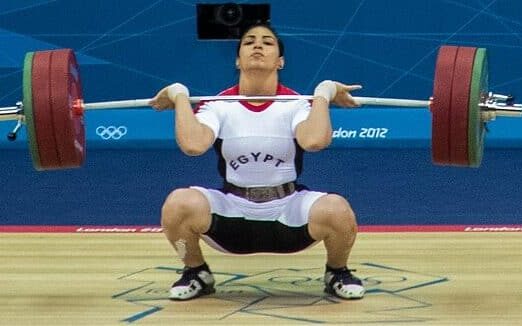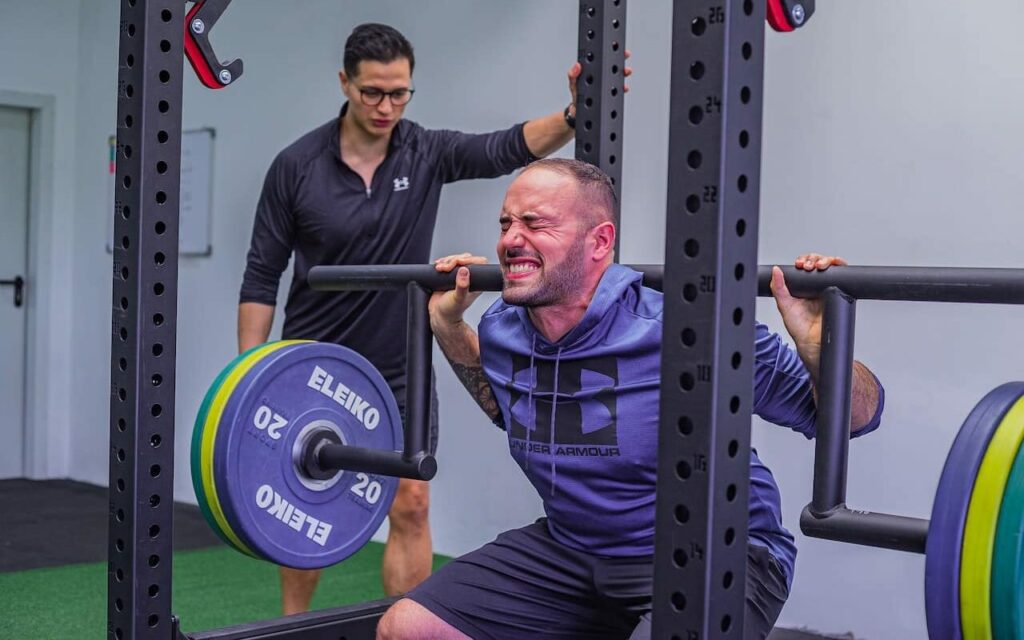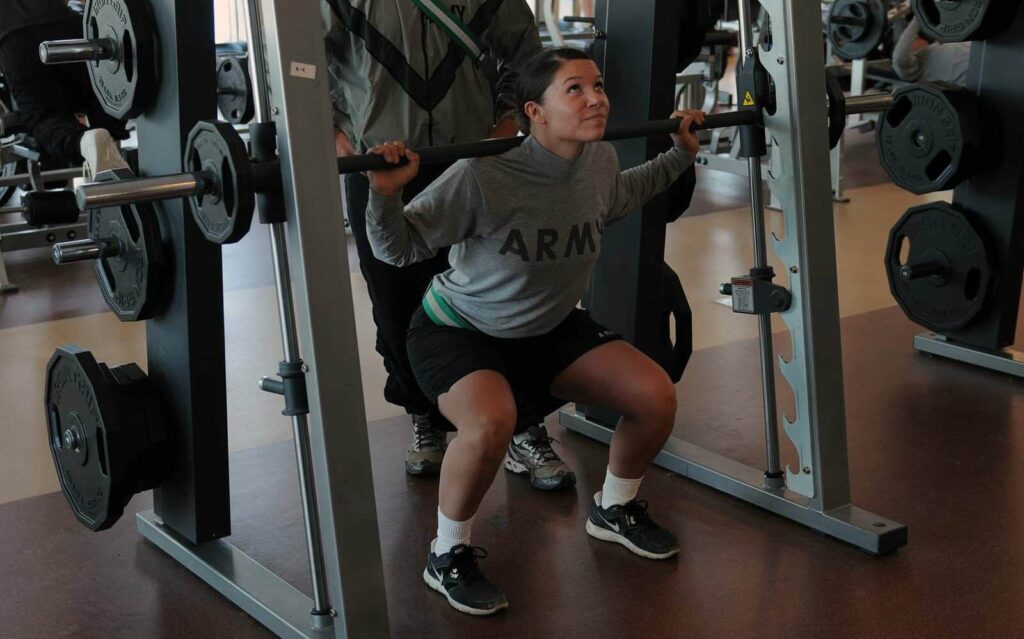Hello there! Have you ever loaded up a barbell for squats and paused, wondering, “Just how much does this bar weigh?” Well, you’re not alone in this.
Knowing the weight of your squat bar is crucial, not just for tracking your progress but also for ensuring you’re lifting safely and effectively.
So, let’s cut to the chase: the standard squat bar, often an Olympic barbell, typically weighs around 45 pounds (20.4 kg).
But remember, this can vary depending on the type of bar you’re using.
I’ll help you figure out the average weights of each type so you have a general idea of each.
Let’s get started!
Key Takeaways
| Question | Answer |
| What is a standard squat bar’s weight? | Approximately 45 pounds (20 kg). |
| Are there different types of squat bars? | Yes, including Olympic, Powerlifting, Safety Squat Bars, and more. |
| Does the type of squat bar affect its weight? | Yes, specialty bars like Safety Squat Bars and Cambered Bars can vary in weight. |
| Is a squat bar necessary for effective training? | It depends on your training goals and preferences. |
| How do you use a squat bar correctly? | Proper technique and form are crucial for effective and safe use. |
| What’s the difference between squat bars and other barbells? | Differences lie in weight, design, and specific use cases. |
Different Types Of Squat Bars
Squatting is a fundamental exercise in strength training, and the type of squat bar you use can significantly influence your workout.
Let’s cover the different types of squat bars, their weights, and the reasons for these variations.
Multipurpose Bars
Men’s Bars – Typically weigh around 45 pounds.
Women’s Bars – Slightly lighter, usually around 35 pounds.
Design Purpose – Multipurpose bars are designed for versatility, suitable for a variety of exercises including squats, deadlifts, and bench presses. The difference in weight between men’s and women’s bars accommodates the generally smaller hand size and lower body weight of female lifters.
Olympic Bars
Men’s Bars – Standard weight is 45 pounds.
Women’s Bars – Usually weigh around 35 pounds.


Design Purpose – Olympic bars are designed for Olympic weightlifting, featuring a level of whip suitable for dynamic lifts like snatches and clean & jerks. The men’s and women’s bars differ in weight and diameter to cater to the different physical requirements and hand sizes of male and female athletes.
Powerlifting Bars
Standard Weight – Around 45 pounds, but squat-specific bars are heavier at 55 pounds.
Design Purpose – These bars are made for powerlifting, focusing on the squat, bench press, and deadlift. They have less whip for stability under heavy loads. Squat-specific powerlifting bars are thicker for a better grip and reduced flex.

Examples include:
- Texas Squat Bar
- Length – 96.5″
- Diameter – 31.75mm
- Bar Weight – 25kg (55lbs)
- Rogue Squat Bar
- Length – 94.49″
- Diameter – 32mm
- Bar Weight – 25kg (55lbs)
Safety Squat Bars
Standard Weight – There is no standardized weight for these due to different designs, but the most popular variations have an average weight of 61.6 lbs.

Design Purpose – These bars are designed for comfort and reduced stress on the shoulders and wrists. They are ideal for those with limited mobility or for targeting specific muscle groups. Popular options include:
- Rogue SB-1 SSB – 70lbs
- Rep Fitness SSB – 68lbs
- Bells Of Steel SSB – 47.5lbs
- Kabuki Strength Transformer SSB – 25kg (55lbs)
- EliteFTS SS Yoke SSB – 65lbs
- Marrs Bar – 65lbs
- Titan Fitness SSB V2 – 61lbs
RELATED – Rogue vs EliteFTS Safety Squat Bar
Cambered Squat Barbells
Standard Weight – Similar to safety squat bars, cambered squat bars have different weights as well. The most popular options are around 70lbs on average.
Design Purpose – These bars, with their unique bend, challenge stabilizing muscles and improve squatting technique. They are excellent for experienced lifters seeking to add variety to their routines. Popular models include:
- Elitefts Rackable Cambered Bar – 65lbs
- Fringe Sport Camber Bar – 75lbs
- American Barbell Camber Bar – 40lbs
- Rogue CB-1 Camber Bar – 85lbs
- Titan Rackable Camber Bar – 85lbs

Smith Machine Bar
Weight – Varies, often lighter due to counterbalance systems.
Design Purpose – The Smith machine bar is fixed within a track, providing a controlled environment for squatting. It’s great for beginners or those focusing on form and technique.

Understanding the nuances of these squat bars will help you make an informed decision for your training needs, whether you’re equipping a home gym or looking to enhance your strength training regimen.
What is a Squat Bar?
A squat bar is a type of barbell specifically designed for performing squats, one of the most fundamental exercises in strength training.
These bars come in various forms, each tailored to different squatting needs and preferences.
From the standard Olympic bar to specialized safety squat bars and cambered bars, squat bars are engineered to enhance performance, comfort, and safety during squatting.
Is a Squat Bar Necessary?
Whether a squat bar is necessary depends on your training goals and the level of specificity you desire in your workouts.
For general fitness and home gyms, a multipurpose barbell often suffices.
However, for more focused training, such as powerlifting, or if you have specific ergonomic needs, investing in a specialized squat bar can be beneficial.
It’s not a strict necessity, but it can be a valuable tool for those looking to optimize their squatting experience.
Does the Weight of a Squat Bar Matter?
Absolutely! The weight of a squat bar matters for several reasons.
Firstly, it affects the total weight you’re lifting, which is crucial for tracking progress and setting goals.
Secondly, different weights can influence the bar’s stability and how it feels during lifting.
Heavier bars might offer more stability, while lighter bars could be more manageable for beginners.
Knowing the weight of your bar helps in accurately calculating the load and tailoring your training regimen.
How is a Squat Bar Used?
A squat bar is used primarily for performing squats, a compound exercise that targets the lower body muscles.
The bar is placed across the shoulders, and the lifter performs a squat by bending the knees and lowering the body before rising back up.
Proper form and technique are crucial to maximize effectiveness and minimize the risk of injury.
Squat bars can also be used for other exercises, depending on their design and the lifter’s training program.
What is the Difference Between Squat Bars and Other Barbells?
The main difference between squat bars and other barbells lies in their design and intended use.
Squat bars, especially specialized ones like safety squat bars or cambered bars, have features tailored to enhance the squatting experience.
These may include different weights, thicknesses, shapes, and additional padding.
In contrast, other barbells, like those for Olympic weightlifting or general-purpose barbells, are designed with a broader range of exercises in mind and may have features like rotating sleeves or different whip (flexibility) characteristics.
Understanding these differences and the specific uses of each type of barbell can help you choose the right equipment for your training needs, ensuring a more effective and enjoyable workout experience.
Other Things To Consider
In the realm of squatting and strength training, there are additional elements that play a crucial role in your workout’s effectiveness and safety.
Let’s explore these aspects, particularly focusing on barbell collars and their varying weights.
Barbell Collars
Barbell collars, while small, are mighty in their importance. They secure the weight plates on the bar, ensuring safety and stability during lifts.
But did you know that different types of collars can add varying amounts of weight to your barbell? Here’s a quick overview:
- Spring Collars – These are the most common and are usually lightweight, adding minimal weight to the barbell.
- Lock-Jaw Collars – Slightly heavier than spring collars, lock-jaw collars offer a more secure grip on the bar.
- Magnetic Collars – These can vary in weight, with some being quite heavy. They provide a strong hold and are easy to adjust.
- Competition Collars – Used in professional settings, these are often heavier and designed to ensure the weights are precisely secured for competition standards.
The weight of each collar will vary, but in general, they can be as low as half a pound and all the way up to 5.5 lbs.
Understanding the weight contribution of your collars is essential, especially if you’re tracking your lifting progress meticulously.
Even a small difference in collar weight can impact the total weight you’re lifting.
How to Squat if the Barbell is Too Heavy
If the barbell feels too heavy, consider these strategies:
- Begin with Bodyweight Squats – Master the form and build foundational strength without any weight.
- Progress to Lighter Bars – Use lighter barbells, such as a women’s Olympic bar or a training bar, to gradually increase your strength.
- Incremental Loading – Slowly add weight to the bar over time, allowing your body to adapt.
- Incorporate Assistance Exercises – Strengthen your lower body with exercises like leg presses and lunges.
- Use a Spotter or Safety Racks – Ensure safety when attempting heavier weights.
Conclusion
Squatting is a key exercise in strength training, and understanding the nuances of your equipment, including the weight of your squat bar and barbell collars, is crucial.
Remember, it’s not just about lifting heavy; it’s about lifting smart. Pay attention to these details, and you’ll be on your way to a safer, more effective strength training journey.
Until next time,
-Dante